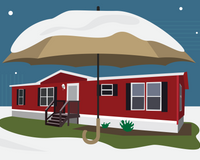This article appeared on U.S. News and was written by Joel Cone.
It's hard for small-time real estate investors to imagine competing with the likes of Sam Zell and Warren Buffett. But while the average investor can only dream of attaining those lofty heights, opportunities exist in the mobile home park marketplace to profit in a different product type from normal brick and mortar.
"We don't want to be in the home business. We want to be in the land business," says Frank Rolfe, owner of the Mobile Home University based in Cedaredge, Colorado. Rolfe, along with his partner Dave Reynolds, boasts being the sixth-largest owner of parks in the country, with 170 parks totaling more than 15,000 lots in 22 states. "We want the park tenants to own their own homes."
When it comes to sheer number of mobile home parks (lots owned) the competition pales in comparison to Zell's Equity LifeStyle Properties (ticker: ELS), a real estate investment trust that owns more than 140,000 lots in 32 states and British Columbia.
And for park owners who need to replace outdated mobile homes, or for future park tenants who want to buy their own mobile home, the largest builder and financier of manufactured housing these days is Clayton Homes, purchased over a decade ago by Buffett's Berkshire Hathaway (BRK.A, BRK.B).
Still, Rolfe estimates that of the roughly 50,000 mobile home parks in the country only about 10,000 are professionally owned, leaving the remainder of the market up for grabs by small investors looking to either diversify their portfolio or change direction with a whole new investment strategy.
Why mobile home parks? Mobile home parks provide a viable form of affordable housing – especially for the nation's low-wage earners and people living at or below the national poverty level.
According to the U.S. Census Bureau's 2016 Poverty Guidelines, a family of four that earns $24,300 or less is living in poverty. Last time it was measured (2014), the Census reported the nation's official poverty rate was 14.8 percent, or 46.7 million people.
A report released in May by the Social Security Administration notes that 38 percent of all wage earners in the U.S. make less than $20,000 a year.
This April, the Census Bureau reported that the national median asking price for vacant rental units was $870. Rolfe estimates that roughly 8 percent of the U.S. population or 20 million Americans presently live in mobile homes. At the state level South Carolina has the most with 16 percent of its population living in mobile homes, he notes.
"In an era where the nation's middle class is steadily shrinking, and aging baby boomers may be looking to cut back on their housing expenses as they head into their retirement years, mobile homes (manufactured housing) may be a viable alternative," says Rick Sharga, chief marketing officer at Ten-X, an online real estate marketplace. "For the right kind of real estate investors, this presents an interesting opportunity."
As with any sort of investment, due diligence is key. The current owners may have set rents that are much below the current market. Checking out the local economy along with on-site interviews with paid staff, local police and the current owners are essential in order to get a complete picture.
Even though he estimates that no more than 10 parks are built in a year, Rolfe remains confident on the upside of owning mobile home parks for investors:
- They have the highest capitalization rate of any real estate niche, he says, roughly 7 to 12 percent, much higher than apartment buildings.
- There are very few, if any, new parks being built while the demand for them remains high – so parks continue to go up in value.
- They can still be bought from the original mom-and-pop investors who have owned them for years and many times those owners will carry the financing so there's no need for a bank loan.
- In the majority of cases, the mobile home owner/tenant does not want to pay to relocate a mobile home when they move, so the homes tend to remain at the park, allowing the park owner to sell them or rent them out.
"Personally, I feel that the niche is very non-market dependent, which is why I like it so much," says Derek Harms, an investor from San Diego. "It's not totally insulated from outside forces, but in real estate I feel it is one of the best. Even if interest rates go up real high, people still need a place to live and you're providing affordable housing. People are going to come to you first."
Learning the ins and outs of park ownership. Like many investors, Harms credits his mentor for helping him establish his career. For him, though, it wasn't some big real estate guru – it was his father. Upon graduating from Sonoma State University, Harms received as a gift from his father a vacant lot in Arkansas. From there he attended seminars to learn about real estate investing.
Today at age 30, Harms is a veteran investor and a real estate agent for Berkshire Hathaway in San Diego. Right out of college he started buying Fannie Mae foreclosures, and tax deeds at auction in Florida – mostly in the Tampa Bay and St. Petersburg areas.
While doing business in Florida he picked up two mobile homes on a single lot. That spurred his interest in mobile home parks – along with his father, who had been investing in them for more than five years by then.
"I had the luxury of partnering with my dad. I can't imagine getting into this business without some partner who can coach you through deals," Harms says. "It's different from other types of real estate investing. Mobile home parks are definitely not for everyone. You have to have a whole different mindset. It's not like apartment buildings. You have to be more willing to bend and work with these people than in the standard apartment business."
As Rolfe explains it, there are five issues an investor needs to watch out for when considering buying and owning mobile home parks – the infrastructure associated with the lots including utility access, local laws regarding maximum density per acre, the historical net income of the park, the age of the homes and the location.
"The best parks are the ones in real expensive areas," Rolfe says. "You will stay packed and will have a waiting list. You want to be the cheap alternative in an expensive world."






